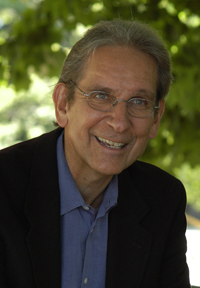 |
John J. Ratey, M.D. |
John J. Ratey, M.D., associate clinical professor of psychiatry at Harvard Medical School, will present “Spark: The Revolutionary New Science of Exercise and the Brain” during the lecture, which is sponsored by the UNMC Department of Neurological Sciences.
The lecture — which will be held at noon in the Durham Research Center Auditorium — is open to the public and lunch will be provided for the first 300 attendees.
The lecture title is the same as Dr. Ratey’s new book, which was released in January. His talk will focus on exercise as a key to solving some of the most prominent health problems.
“Exercise is the single most powerful tool we have to optimize brain function,” Dr. Ratey said. “This potent idea has been proven not only through the latest studies in neuroscience but also on the playgrounds of some of America’s schools. The evidence is astounding — exercise not only makes us smarter; it also makes us less stressed, depressed, and anxious.”
Dr. Ratey’s book lauds the benefits of exercise in improving cognitive function, reducing stress, weight, depression and memory loss associated with age.
To boost brain health, Dr. Ratey recommends committing to six hours of exercise a week.
“The best regime is some form of aerobic activity six days a week, for 45 minutes to an hour,” he said. “Four days should be on the longer side, at moderate intensity, and two on the shorter side, at high intensity.”
As a clinical researcher, Dr. Ratey has published more than 60 papers in peer-review journals in the fields of psychiatry and psychopharmacology. In 1986 he founded the Boston Center for the Study of Autism, and in 1988 he founded a new study group of the American Psychiatric Association focused on the study of aggression, which grew out of his research and development of novel drug treatments for aggressive behavior.
During this time Dr. Ratey lectured internationally on aggression and disturbances in the brain that affect social functioning.
In 2000, he wrote the bestseller, “A User’s Guide to the Brain: Perception, Attention and the Four Theaters of the Brain,” which translates how neuroscience affects emotions, behavior and overall psychology.
Click here to see more information about Dr. Ratey.
The Harman Lecture is named for Denham Harman, M.D., Ph.D., the Emeritus Millard Professor of Medicine at UNMC who is known internationally as the father of the Free Radical Theory of Aging, which he proposed in 1954.
The theory is one of the most well-known and respected theories on the aging process.
Dr. Harman proposed that free radicals — highly reactive molecules freed in the normal chemical processes — cause aging and disease through their destructive actions in cells and tissues. The theory suggests that antioxidants such as vitamin E, C and beta carotene can decrease the chain lengths of free radical reactions.